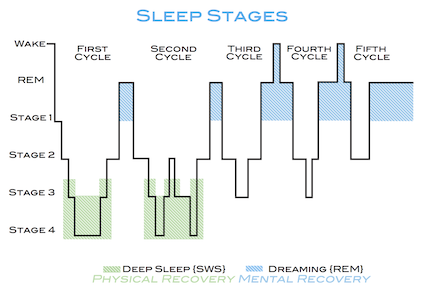Good sleep is absolutely essential for optimal physical and mental performance. Yet, compared to diet and exercise, sleep receives little attention. Most people greatly underestimate the importance of sleep. Without good quality sleep, maintaining your diet and exercise regimen is nearly impossible. And, contrary to popular belief, you can not train yourself to need less sleep.1 While you may believe that you are capable of adapting to a lack of sleep, you are not. You continue to lose your ability to think, remember, reason, and/or learn with increasing sleep deprivation. So, make improving your sleep quality and quantity a priority.
Why Do We Need Sleep?
Sleep restores the body physically and mentally.
During the night, a normal sleeper cycles between different sleep stages, alternating between non-REM and REM sleep. Normal sleep architecture typically consists of four or five non-REM and REM periods. When these stages are graphed on a diagram, called a hypnogram, the different stages of sleep resemble the outline of a city skyline.
In the first half of the night, your body gradually drifts into deep sleep (Stage 3 and Stage 4). Most deep sleep occurs in the first half of the night. As the night progresses, REM sleep gets longer and deep sleep decreases. During deep sleep, the pituitary gland releases a burst of growth hormone. This burst of growth hormone works to stimulate muscle repair, tissue growth, and fat metabolism making you fitter, stronger, and leaner. Increasing the amount of deep sleep you get increases the amount of growth hormone that your body releases.2
In the second half of the night, your body spends more time in REM (rapid eye movement) sleep, or dreaming sleep. While deep sleep repairs the body, REM sleep repairs the mind. REM sleep helps learning and memory. Loss of REM sleep hurts attention, memory, quantitative skills, and logical reasoning4 making you less likely to excel in the office.
Both parts of sleep are essential! Additionally, sleep deprivation increases the risk of high blood pressure, heart disease, obesity, and diabetes. So, do not forget about the importance of sleep! To find out about sleep and aging, sleep and alcohol, common sleep problems and solutions, and getting better sleep for improved physical and mental performance.
Read On
- Sleep and Aging
- Alcohol and Sleep
- How To Sleep Better Guide
- Sleep Problems: Insomnia
- Sleep Problems: Sleep Apnea
- Sleep Apnea Questionnaire
- Sleep Cycle Apps
External Resources: NHLBI: Importance of Sleep
Updated: April 10th, 2015
1. Durmer JS, Dinges DF. Neurocognitive consequences of sleep deprivation. Semin Neurol. Mar 2005; 25 (1): 117-129.
2. Van Cauter E, Leproult R, Plat L. Age-related changes in slow wave sleep and REM sleep and relationship with growth hormone and cortisol levels in healthy men. JAMA. Aug 2000; 284 (7): 861-868.
3. Van Cauter E, Plat L, Copinschi G. Interrelations between sleep and the somatotropic axis. Sleep. Sep 1998; 21 (6): 553-566.
4. J M. Brain Rules: 12 Principles for Surviving and Thriving at Work, Home, and School. Seattle, WA: Pear Press; 2000.






